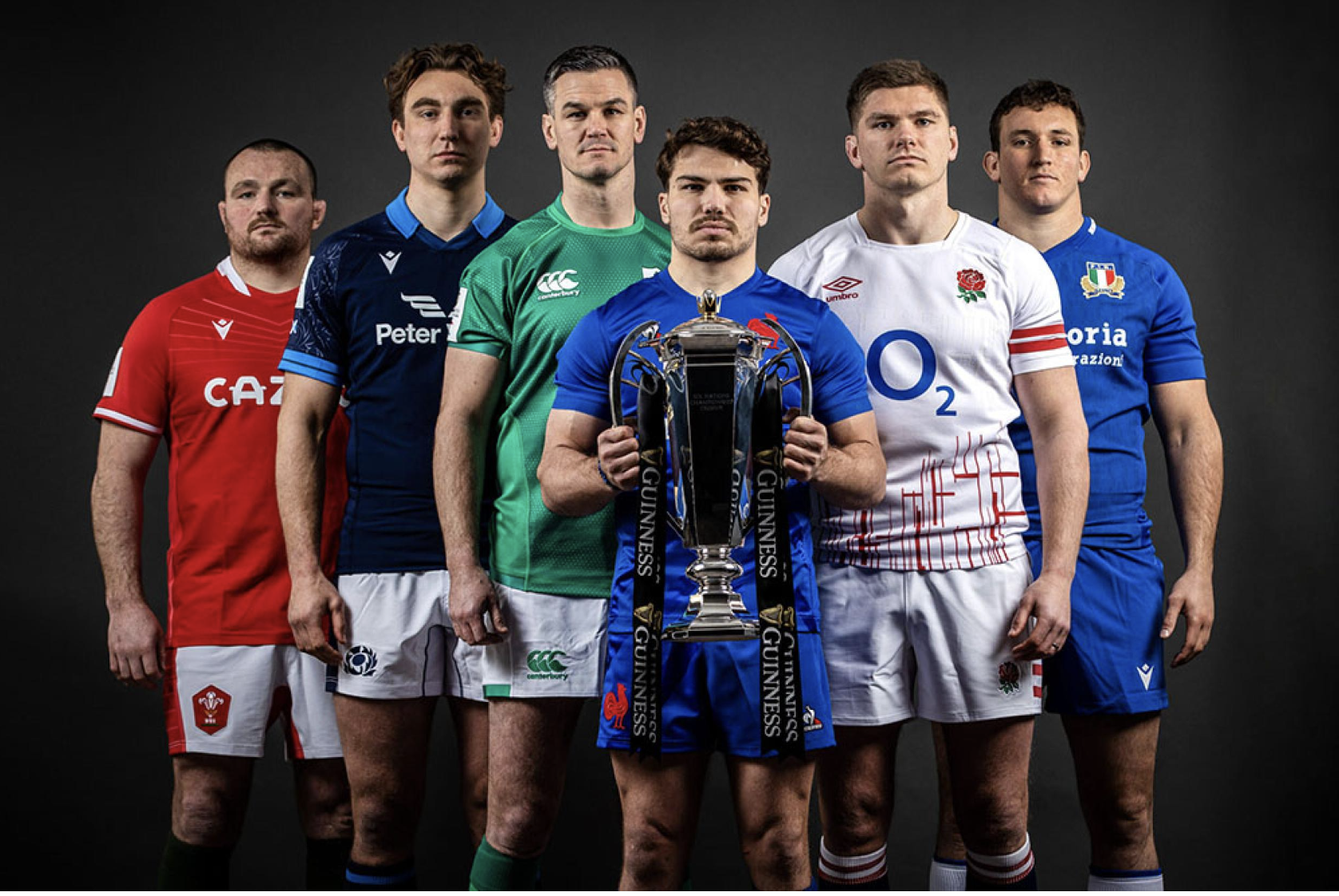Water is the main component in our body, making up around 60% of our weight. Water has various functions in the body, including:
• Helping our bodies to regulate temperature;
• Acting as protection for organs and a lubricant for joints;
• Being a main constituent in saliva, which helps lubricate and digest our food;
• Giving our tissues moisture (e.g. to our eyes, mouth and nose);
• Carrying nutrients around the body to the cells that need them; and
• Providing a solvent for removing waste products from our body (via sweat, urine and faeces).
Daily water intake
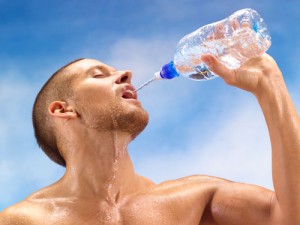 The Department of Health recommends consuming just over 2L of water a day.
The Department of Health recommends consuming just over 2L of water a day.
However, it is important to note that we are all individuals and the amount we need depends on various factors, for example our body weight. It also depends on atmospheric humidity and temperature.
Many professionals recommend relying on thirst for your day-to-day water intake.
The majority of our water intake is via fluids, however, food has water in it too, and it can contribute up to 30% of our daily water intake. Foods with high water content include:
• Soup;
• Fruit (e.g. cucumber, melons, tomatoes); and
• Most vegetables (e.g. celery).
Exercise and dehydration
Being physically active also increases our water needs. During exercise we lose fluid more rapidly; mainly through increased breathing rates and sweating. This loss of water can lead to what is called hypohydration, or dehydration to most of us – the reduction in body water content.
A water loss as little as 2% of body weight (e.g. if you weight 70kg this will be a loss of 1.4kg) has been associated with decrements in performance, including aerobic performance and sport-specific skills.
Generally, aerobic tasks are affected more than strength and power.
Dehydration causes increased strain on the cardiovascular and thermal system. This can lead to reduced sweating and skin blood flow responses, which can lead to increases in core and skin temperature, contributing to fatigue.
Dehydration can lead to symptoms such as increased sensation of effort, low levels of concentration, tiredness, lack of alertness, headaches and more.
How to assess your hydration status
 Unless you are in a physiology lab it is hard to accurately measure this, however, there are some slightly more crude measures to test your hydration status in the field:
Unless you are in a physiology lab it is hard to accurately measure this, however, there are some slightly more crude measures to test your hydration status in the field:
• Monitor you urine losses – if you are urinating frequently and large volumes it is likely you are taking on board too much fluid, however, infrequent and small amounts of urination can be a sign of dehydration
• Urine colour – darker urine is a sign of dehydration. Use the chart on the right. The aim is for a pale yellow / deep amber colour, not too light or dark. Beware that some foods may also change the colour of your urine though (e.g. beetroots and berries). It is best to assess hydration in the morning, before these foods may be eaten, and if over one week the colour is not optimal on most days you need to think about changing your hydration strategy.
Water intake when exercising
Due to the impact of dehydration on performance, relying on thirst around exercise perhaps isn’t ideal, and more effort should be taken to optimise hydration status – especially for those who may just forget to drink.
Before exercise
Making sure you are well hydrated when you start will prolong the onset of dehydration during exercise. Therefore, make sure you drink adequate amounts before exercise and check your hydration status to help you.
A rough guide is to drink around 500ml little and often in the 2 hours before – but you need to test what is comfortable for you.
Also, beware that water will make you heavier, so you don’t want to drink too much that it negatively affects your performance through weight gain – so have a balance and don’t drink so much that you are constantly nipping to the toilet.
During exercise
Whether or not you drink during exercise depends on the duration and intensity of exercise, the heat and individual preference (e.g. some don’t find drinking comfortable).
If exercise is prolonged (e.g. greater than 40 minutes) and intense, and / or temperature and humidity is high then it is recommended water should be taken on board.
If the temperature is particularly high, chilled liquids have been shown to help reduce body temperature, thus helping to reduce the onset of fatigue. Also high temperatures lead to high sweat, and therefore salt losses. If the duration of exercise is greater than 2 hours in these conditions, having a drink containing sodium may be necessary (e.g. a sports drink).
Ultimately, you should practice what is comfortable for you during training to help put together a plan for competitions.
It is also important to note that you should not overdrink. If you drink excessively, this can lower the concentration of sodium in the blood. If the sodium concentration drops really low (a condition called hyponatremia) it can be fatal. Whilst this is quite rare, just be aware that you don’t need to drink substantial amounts if you are not exercising long, or sweating much.
After exercise
We need to replace the water we have lost in order to recover.
If there is no urgency for recovery, the replacement of this fluid can be through normal eating and drinking practices. However, if you need more rapid recovery (e.g. next training session <24h away, or during tournaments) more vigorous replacement of fluid may be needed. [blockquote]When we drink a volume of water in one go, our bodies naturally excrete some of the water we take on board through a diuretic response, and so we should consume quantities of water greater than the amount we have lost during exercise in order to optimise recovery of water balance. This amount is around 150% of what you have lost.[/blockquote]
How to work this out
 Start by weighing yourself before and after exercise. Any weight lost in kg is equal to water lost in litres. If you have lost 1 kg this will equate to roughly 1L of fluids and so you should aim to drink 1.5L to recover.
Start by weighing yourself before and after exercise. Any weight lost in kg is equal to water lost in litres. If you have lost 1 kg this will equate to roughly 1L of fluids and so you should aim to drink 1.5L to recover.
Weighing yourself will also tell you how well you are maintaining hydrated during exercise. For example, if you lose lots of weight (>2% of your body weight) you perhaps need to drink more next time, if you gain weight you need to drink less.
The diuretic response is even greater if we drink a large volume of water in one go and so try to drink the required amount in a “little and often” pattern of consumption.
Another way we can help our bodies absorb more of the water we drink is by consuming water plus another nutrient that will slow gastric emptying and thus give the body more time to absorb the water. An example of this is a drink with added protein or added carbohydrate (e.g. milk or sports drinks).
Salt
It is also important to replace electrolytes lost in sweat. The key one lost is sodium.
Again, if recovery is not urgent, we can replace this sodium through foods – for example through pretzels, olives and marmite. However, if sweat loss is very high, or you are a “salty sweater” ** you could replace some straight away with a sports drink containing sodium (containing around 60-100mg per 100ml), or another drink with sodium (e.g. milk).
** to test if you are a salty sweater you could wear a black t-shirt to training and note whether you have salt stains (white powder) on the t-shirt (mainly in armpit and chest area) after you finish.
High salt losses can be a contributing factor to muscle cramps, so if you suffer from these often, you should think about introducing more sodium into your diet around exercise.
Caffeine
Caffeine is a diuretic (stimulates the production of urine), however, the amount of fluid you drink per caffeinated drink compensates for the diuretic effect. This means that the water the caffenated drink contains will more than match the fluid loss that the caffeine causes – leaving you in a positive fluid balance (i.e. you still gain water!).
Conclusion
I hope this helps you to optimise your hydration and prevent dehydration from negatively influencing your performance.
Remember, we are all individuals, so you should establish and practice the right strategy for you! If you have any questions or comments, please feel free to leave them below.








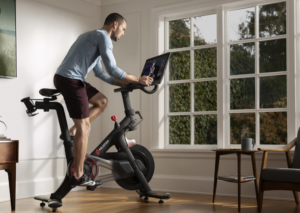 When most people hear the word “Peloton” they think of an expensive black bike with shiny red buttons and that controversial commercial where the husband gifted his wife a Peloton for Christmas.
When most people hear the word “Peloton” they think of an expensive black bike with shiny red buttons and that controversial commercial where the husband gifted his wife a Peloton for Christmas.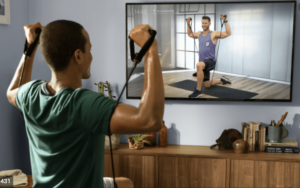 If the app interests you, Peloton is currently offering a 30 day FREE TRIAL, so why not give it a try? Check it out
If the app interests you, Peloton is currently offering a 30 day FREE TRIAL, so why not give it a try? Check it out 
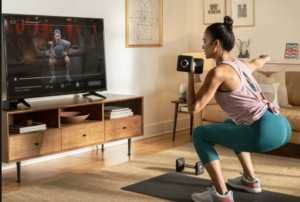
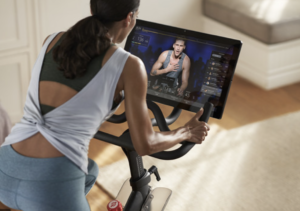 This article would not be complete, however, if we did not acknowledge some of the delivery issues that have been plaguing Peloton over the last year. Most of the delivery issues seem to affect U.S. deliveries, however, the UK deliveries have been affected as well.
This article would not be complete, however, if we did not acknowledge some of the delivery issues that have been plaguing Peloton over the last year. Most of the delivery issues seem to affect U.S. deliveries, however, the UK deliveries have been affected as well.







